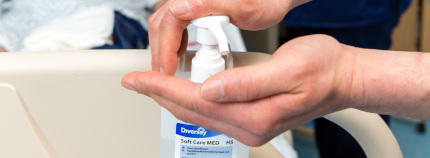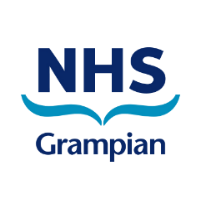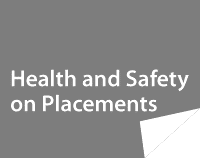
Health and Safety
NHS Grampian takes the safety of pupil and adults on placement very seriously, as indeed it does for all patients and staff. Policies and procedures are agreed by the organisation to ensure legislative requirement in terms of placement, are met. These requirements include the development of a risk assessment for each placement which is agreed and made available to parents and Local Education Work Experience Units in Moray, Aberdeen City and Aberdeenshire prior to placement.
Guidance for Pupils
(Further guidance on managing the risks associated with pupil work placement can be found in Young people and work experience - a brief guide to health and safety for employers. Guidance for adults appears lower down this page)
Dress Codes
A copy of the dress code for pupils is below but you should discuss this with your placement supervisor when you call to confirm your acceptance of the placement, as in certain areas special clothing or overalls will be provided for you. Use common sense when deciding what to wear and remember that ward areas in hospitals can be very hot so you should try to wear light clothing to prevent you becoming too hot.
When deciding what is appropriate clothing to wear please remember that hospitals are communities of people from many backgrounds and of all ages and your choice of clothing can inadvertently cause some people offence or distress. Accordingly clothing that exposes your midriff or your underwear is not acceptable.
The requirement for pupils to wear items of clothing as a religious duty will be respected.
Reporting For Work Procedures
Depending on where you are placed the reporting procedure will vary. You should receive details from the Work Experience Unit. NHS Grampian would, however, appreciate if you could contact your placement before you start to make sure you understand where you have to go, at what time and if they have any special requirements in the way of dress code.
Confidentiality and Security
Although issues of confidentiality will have been discussed with you by your teachers, on the first day of your Work Experience Placement you will be asked to read and sign a Confidentiality Form. It is essential that you understand that confidentiality must be upheld at all times and that it is the right of every patient to have their privacy and dignity respected at all times.
You will also be issued on the first day of your placement with a Name Badge which you MUST wear at all times. It is essential that this badge be returned to your supervisor each day and at the end of your placement.
During your Work Experience Placement you have all the rights of an employee under the Health & Safety at Work etc Act 1974. You also have the responsibility to:
- Take care of yourself and others
- Co-operate with your placement provider
- Not to interfere with anything provided for your safety
Please remember to keep to an absolute minimum any valuables which you bring on site. You must ask your Manager where you can safely store your possessions. NHS Grampian cannot accept any responsibility for items belonging to pupils which are left unattended and which are lost or stolen whilst on placement.
Personal Hygiene
During your placement within NHS Grampian you will be expected to play your part in the control of Healthcare Associated Infection and demonstrate the highest standards of personal hygiene at all times. You will be expected to wash your hands at regular intervals throughout the day and especially on entering clinical areas, before eating, and after using the toilet.
Introduction to your Department/Wardp>
On the first morning of your placement you will be introduced to as many of the staff as are available and be instructed on: Workplace Hazards, Safety Precautions and Emergency Procedures.
Evaluation of Your Placement
NHS Grampian will issue you with a very short Evaluation Form which we would appreciate if you could complete and return to your supervisor. This will give us an idea of how beneficial and enjoyable your placement with us has been.
We hope that your Work Experience Placement at NHS Grampian, whichever Department you are placed in, offers you a useful insight into the world of work and that you perhaps take away a clearer idea of what you would like to do when you leave school. Good luck!!
Pupils' Dress Code
Shoes
Trainers or low heeled fully enclosed shoes should be worn. Shoes with any heel are discouraged as it can lead to discomfort and/or accidents within the work place.
Shirt/Blouse
A shirt/blouse or tidy sweatshirt can be worn.
Trousers/Skirt
Smart trousers in good repair should be worn. A knee length skirt may be worn that is not too tight as this can be dangerous in the work place. Mini skirts are also unsuitable as they too can be dangerous in the workplace. Jeans are not allowed.
Jewellery
Jewellery should not be worn as it can cause accidents. Earrings can be worn but they must be the stud type, one pair only (one earring per ear lobe). Nose studs and other visible body piercing are not acceptable.
Nails
Should be short, clean and varnish free as you may be helping a patient.
Hair
Long hair should be tied back.
Make-up
Make-up can be worn but it should be light and inoffensive.
Guidance for Adults
In general the restrictions placed on staff take the form of prohibitions found in specific regulations such as the Ionising Radiation Regulations etc, however as they will be under supervision at all times, the generic guidance that follows will ensure that the foreseeable hazards mature persons may be exposed to are appropriately managed.
Confidentiality
Before commencing their placement the individual should be asked to read and sign the Confidentiality Statement provided. It is essential that they understand that confidentiality must be upheld at all times and that it is the right of every patient to have privacy and dignity respected at all times.
Introduction to Ward/Department
It is recommended that on their first morning the individual is introduced to as many of the team as possible and is instructed on the following: Workplace Hazards, Safety Precautions and Emergency Procedures.
Attendees should be shown where to secure their belongings.
Workplace Hazards
The following lists of workplace hazards are not exhaustive and are meant as a guide for managers to consider when dealing with adults on Work Experience placements:
Prohibited Plant and Machinery
Clearly identify any plant or machinery that mature person must never operate or approach.
Machinery
Explain to individual that they must never operate any machine without the permission and direct supervision of the supervisor.
Hazardous Substances
Identify hazardous substances present and the necessity for them to be avoided. Explain the importance of complying with notices and advice given on container labels.
Environments where there is any risk of exposure to toxic or carcinogenic substances are not suitable for work experience placements.Lifting and Manual Handling
Do not allow lifting or handling of patients or moving of heavy or awkward objects, either with or without lifting aids.
General
Explain the importance of basic safety e.g. keeping drawers and cupboard doors shut, safe positioning of loose cables for telephones, computers etc; safe storage of materials; keeping the work area clean and tidy.
Safety Precautions
Safe Systems of Work
Explain the importance of safe working practices. Some procedures will expose the attendee to risks. Explain these and instruct the individual about safe working practice. Ensure attendees get any further briefing they need before they move on to something new.
Protective Clothing
Describe what is provided, when and why it must be used and how to make any necessary adjustments. Where protective clothing or equipment is required the supervisor must ensure it is worn correctly or the individual is removed from the risk.
Safety Equipment
Explain when and why it must be used, where it is kept and how to use it. Where protective clothing or equipment is required the supervisor must ensure it is worn correctly or the individual is removed from the risk.
Hygiene
Notify individual where the lavatories and washing facilities are and explain the importance of hand washing on entering and exiting the workplace and at regular intervals to reduce the risk of spreading infections.
It is recommended that adults undertaking placements in clinical areas should be instructed in how to wash their hands correctly and demonstrate their level of ability before entering clinical areas.
Exclusion
The individual must be aware that they should not attend their placement if suffering from any of the following:-
- Diarrhoea and/or Vomiting
- Colds and/or Flu
- Rashes (that are not confirmed as harmless by a doctor)
- Generally feeling unwell
Emergency Procedures
First Aid
Indicate who the department/ward/nearest First-Aid person is and where they can be located.
Accident Procedure
Explain that all accidents, no matter how small, must be reported and to whom the individual should report in the event of any accident.
Fire Alarm
Explain what the individual should do if they discover a fire. Describe how they will know if the alarm has been raised.
Emergency Evacuation
Explain the procedure for emergency evacuation including the route to be taken, use of emergency exits, assembly points and reporting procedures. It is important to stress that there should be no running during the evacuation.
Distressing Situations
Whilst the individual should not be exposed to situations they may find excessively stressful or distressing, it is understood that placements taking place in clinical areas may result in them being exposed to traumatic or distressing situations. In the event of clinical emergencies the individual must be directed to the nearest rest/relatives room and instructed to wait there until a member of staff collects them.
In the event that the individual becomes distressed themselves, they will be provided with the same support offered to NHS Grampian employees including, where necessary, access to Occupational Health Services.
And Finally -
It is important that adults on Work Experience are supervised, or within reach of an appropriate member of staff, at all times whilst they are on NHS Grampian premises and are confident about the nature and method of the tasks they have been given to do.
The Policy and Procedure is structured in such a way as to ensure the individual gain as much as possible from the facilities available and to safeguard NHS Grampian from possible Health and Safety and Insurance problems.
Please remember, the placement that the individual receives may not be their first choice. Whilst we are unable to screen the person before a placement we do recommend that wherever possible you arrange a telephone conversation with attendee or a face to face meeting.
If there are any matters arising or further information required from these guidelines, please contact the Learning & Development team on grampian.learningdevelopment@nhs.net.
![]() You may also be interested in
You may also be interested in





